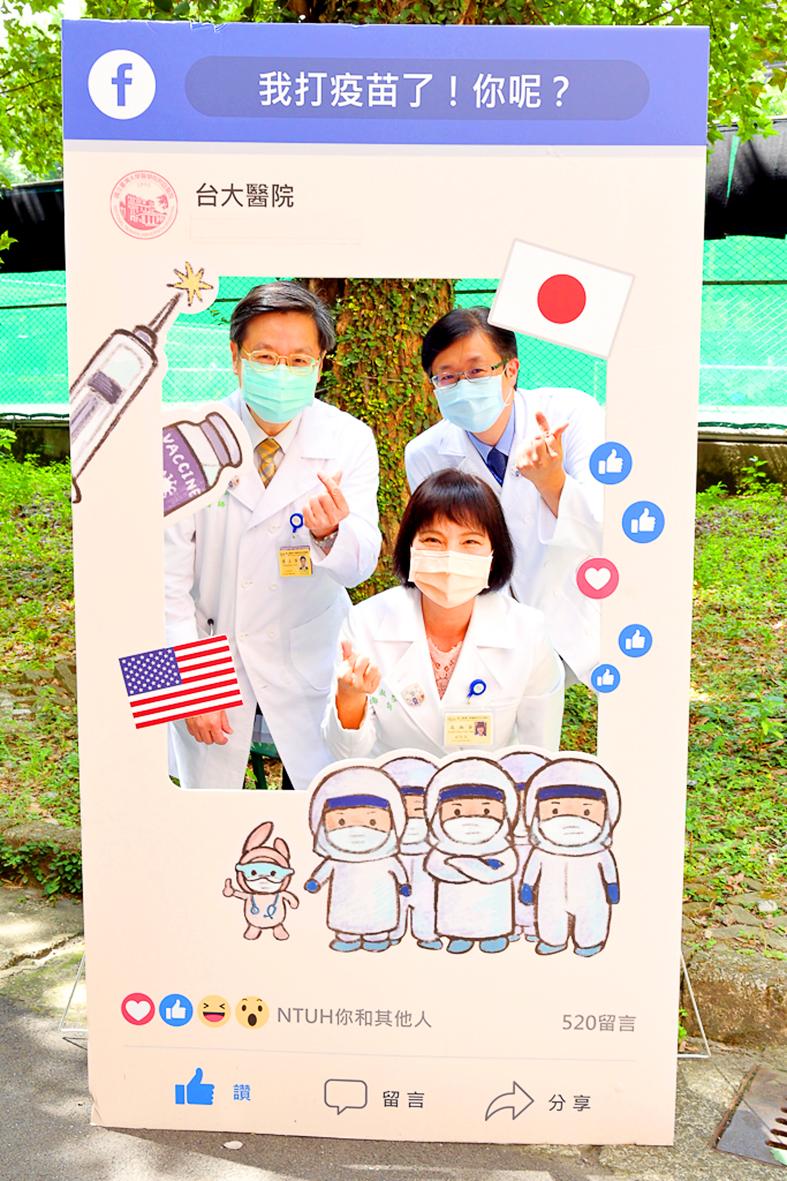National Taiwan University Hospital (NTUH) is studying the effects of mixing COVID-19 vaccines by administering a dose of the AstraZeneca vaccine followed by a dose of the Moderna vaccine, it said on Saturday.
The hospital announced the study at a news conference to celebrate the 100,000th dose of COVID-19 vaccine administered at the facility.
More than 100 healthcare professionals and administrative staff have been deployed to vaccinate people, administering about 2,000 doses per day, with a record of 4,056 doses administered in one day, the hospital said.

Photo provided by National Taiwan University Hospital via CNA
The Advisory Committee on Immunization Practices on Sunday last week approved a mix-and-match approach to COVID-19 vaccines, with a first dose of the AstraZeneca vaccine and a second dose of a messenger ribonucleic acid vaccine, such as the Moderna or Pfizer-BioNtech vaccine.
Regarding the hospital’s research on mixing vaccines, NTUH Family Medicine Department attending physician Chang Hao-hsiang (張皓翔) said that one of its two studies on the practice involve testing the effects of receiving a dose of the AstraZeneca vaccine with a second dose of the Moderna vaccine.
The study is being directed by National Taiwan University vice president Chang Shan-chwen (張上淳), who is also convener of the Central Epidemic Command Center’s (CECC) specialist advisory panel.
The study participants are all NTUH staff, who have been divided into four groups of 100 and have already received their first shot — either the AstraZeneca or the Moderna vaccine, Chang Hao-hsiang said.
The groups include people receiving two doses of the AstraZeneca vaccine, four weeks apart; two doses of the AstraZeneca vaccine, eight weeks apart; two doses of the Moderna vaccine, eight weeks apart; or a dose of the AstraZeneca vaccine, followed by a dose of the Moderna vaccine, eight weeks apart, he said.
The neutralizing antibody potency and immunity potency of the participants would be compared, with a preliminary result expected in a few weeks, which would be publicized and provided to the CECC as reference for making vaccine policy on a mix-and-match approach, he said.

Eight restaurants in Taiwan yesterday secured a one-star rating from the Michelin Guide Taiwan for the first time, while three one-star restaurants from last year’s edition were promoted to two stars. Forty-three restaurants were awarded one star this year, including 34 in Taipei, five in Taichung and four in Kaohsiung. Hosu (好嶼), Chuan Ya (川雅), Sushi Kajin (鮨嘉仁), aMaze (心宴), La Vie by Thomas Buhner, Yuan Yi (元一) and Frassi in Taipei and Front House (方蒔) in Kaohsiung received a one-star rating for the first time. Hosu is known for innovative Taiwanese dishes, while Chuan Ya serves Sichuan cuisine and aMaze specializes

STATS: Taiwan’s average life expectancy of 80.77 years was lower than that of Japan, Singapore and South Korea, but higher than in China, Malaysia and Indonesia Taiwan’s average life expectancy last year increased to 80.77 years, but was still not back to its pre-COVID-19 pandemic peak of 81.32 years in 2020, the Ministry of the Interior said yesterday. The average life expectancy last year increased the 0.54 years from 2023, the ministry said in a statement. For men and women, the average life expectancy last year was 77.42 years and 84.30 years respectively, up 0.48 years and 0.56 years from the previous year. Taiwan’s average life expectancy peaked at 81.32 years in 2020, as the nation was relatively unaffected by the pandemic that year. The metric

Taitung County is to launch charter flights to Malaysia at the end of this year, after setting up flights to Vietnam and Thailand, the Taitung County Government said yesterday. The new charter flight services, provided by low-cost carrier Batik Air Malaysia, would be part of five-day tour packages for visits to Taitung County or Malaysia. The Batik Air charter flight, with about 200 seats, would take Malaysian tourists to Taitung on Dec. 30 and then at 12:35pm return to Kuala Lumpur with Taiwanese tourists. Another charter flight would bring the Taiwanese home on Jan. 3 next year, arriving at 5:30pm, before taking the

Taiwan High Speed Rail Corp. (THSRC) plans to ease strained capacity during peak hours by introducing new fare rules restricting passengers traveling without reserved seats in 2026, company Chairman Shih Che (史哲) said Wednesday. THSRC needs to tackle its capacity issue because there have been several occasions where passengers holding tickets with reserved seats did not make it onto their train in stations packed with individuals traveling without a reserved seat, Shih told reporters in a joint interview in Taipei. Non-reserved seats allow travelers maximum flexibility, but it has led to issues relating to quality of service and safety concerns, especially during